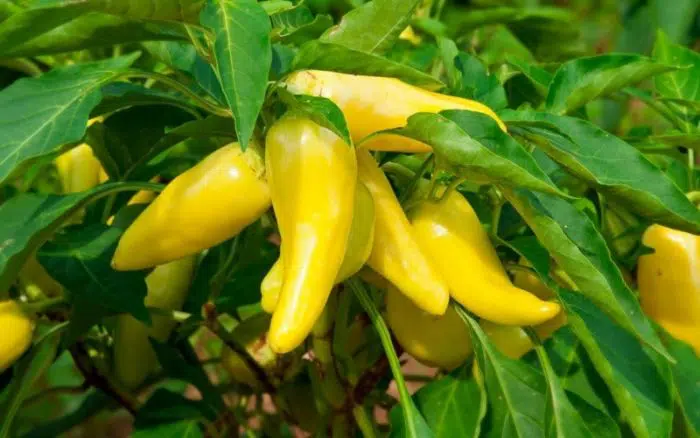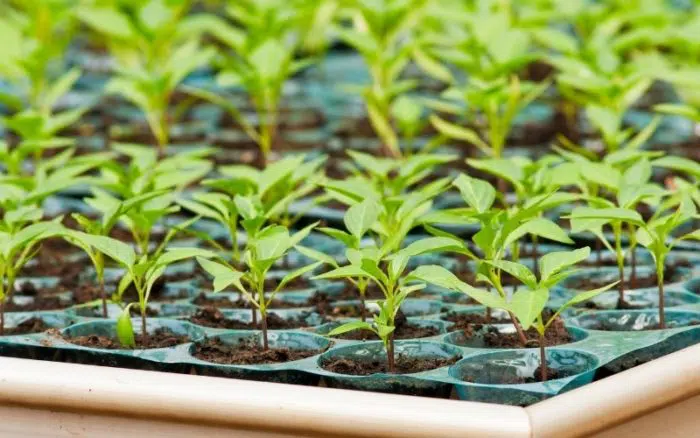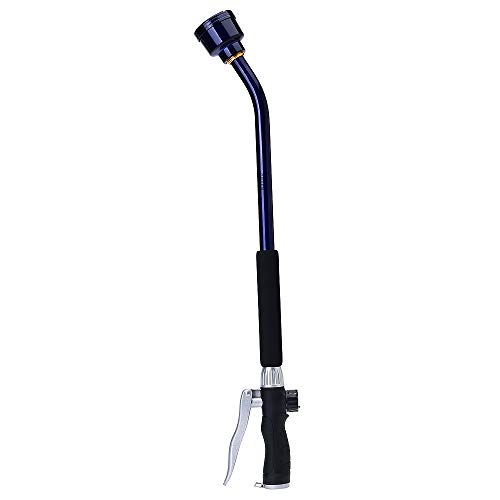How Much Water Do Peppers Need
Peppers are drought-tolerant plants, meaning they can survive with less water because their root system is more branched out.
For optimal growth, peppers need 1-2 inches of water each week. This amount can be adjusted based on the soil type, the weather, and what types of peppers you’re growing.
When you are watering peppers, water the soil thoroughly (deep watering) so it sinks down around 6 inches below the surface and can reach the plant roots.
How Often to Water Peppers
We know how much peppers need to be watered, but how often should be watering them? What’s the watering schedule?
As a general rule of thumb, you should water peppers about once every few days. If the weather is particularly hot or dry, you may need to water more frequently. On the other hand, if it’s been raining quite a bit, you will be able to get away with watering less often.
Ultimately, the best way to determine how often to water your peppers is to check the soil regularly. If it feels dry about an inch below the surface, it’s time to give your plants a drink of water.
Whether you’re growing in-ground plants, or in a pot, or are starting seedlings indoors and transplanting them outside, they are going to have different needs. Let’s take a look at each scenario for growing peppers.
Where You Are Growing Peppers Matters
Watering pepper plants depends a lot on where you are growing them. You might think your pepper plants should all need the same amount of water, right? Wrong.
Watering Pepper Plants in Raised Beds & in the Ground
If you have pepper plants in raised beds or in garden beds, you usually only need to water them every few days unless it’s really hot outside. Depending on which zone you live in, your peppers can often see quite a bit of rain during parts of the season.
If you live in a more dry area or are experiencing weeks where there is no rain in sight, you’ll want to check your peppers daily to make sure they don’t need water.
Depending on what stage you are at, they have different water requirements.
- With tender seedlings that are younger, they often do best getting watered more regularly. Check on them daily and make sure the soil doesn’t need watering.
- With a more mature, full-grown peppers, they are hardier and can usually go a few days without being watered.
When overhead watering, be sure to use your hose nozzle on the lowest setting or invest in an inexpensive watering wand that helps with accuracy. You want to water the ground around the peppers, as wetting the leaves and flower heads can invite fungus and plant viruses to take hold.
If you’ve grown tomatoes before, you know that when watering tomatoes you don’t want to get the leaves wet. Peppers are also a variety of nightshade and don’t do well with wet leaves.
- Made with aluminum making it lightweight, yet durable
- Rubber foam along the wand for additional protection at the natural wearing point.
Add Mulch to Your Garden
When growing peppers in the ground, you can save yourself a lot of hassle by adding mulch around the plants.
This helps reduce water evaporation and keeps the soil surrounding the plant from getting too hot, causing your plants to dry out too quickly. On the other side of the coin, mulch will help the ground temperatures to stay consistent if temperatures fall overnight suddenly. Peppers, especially hot peppers, love where there is an abundance of heat.
Another added benefit of organic mulch is that it reduces the splash-back effect and helps prevent dirt and possible disease from splashing up onto the leaves when it gets watered or it rains.
Drip Irrigation System
You can also use a drip irrigation system, which can take most of the guesswork out of when to water peppers.
You hook the system up to your garden hose and it automatically drips out the water regularly throughout the day.
Potted Pepper Plants
If you planted peppers in a pot (even if it’s sitting by the door or on the patio), it will require more attention because of its climate. The sun’s rays are much stronger than the light it will get indoors, and that could cause the soil to dry out faster.
I like to deep water outdoor pepper plants in pots, making sure the entire pot is wet and drains the excess water. Usually, after a good watering, you can skip the next day (unless it’s going to be really hot).
If the weather is calling for a lot of rain, hold off on watering the plant so it doesn’t get overwatered.
Keep the soil moist and water as often as every three days. But also make sure the plant does not sit permanently in wet soil or this can cause overwatering issues (see below).
If the weather forecast is super dry and hot, make sure to check the plant daily (sometimes more than once per day) to see if your outdoor peppers need a drink of water.
With potted plants, you want to water often so the soil does not dry out completely, but be aware that overwatering pepper plants can also damage the plant. Avoid watering after dark, as this is just inviting pests and fungus to take root.
Indoor Pepper Plants
An indoor pepper plant might require less water when its not as warm and the wind isn’t blowing as hard. However, if you do have fans on your plants, then you might want to treat them similarly to if they were outdoors.
Unlike outdoor plants, when you plant peppers inside they don’t experience rain so all of their water needs are manually being met by you (unless you’re growing them hydroponically).
Pepper Seedlings
I love starting seeds indoors to get a headstart on the growing season. But some pepper varieties can be hard to germinate. Jalapenos take 2-3 weeks to even just sprout, so it can get tedious checking on them every day and watering them.
I water my seedlings daily, or at least every 2 days. The pots they start off in are small and drain really fast, so without daily watering, they can dry out easily.
Once the plants have sprouted and they are up potted into larger containers, the watering doesn’t need to happen quite as often.
The Types of Peppers

The pepper variety you are growing is going to impact the amount of water and frequency of watering as well.
The types of peppers don’t matter as much as you’d think. Whether you are growing bell peppers, chili peppers, or cayenne peppers, they all need to be adequate water. The growing conditions matter more than the types of peppers in these cases.
How to Tell if Peppers Need Water
Peppers grow best when they are properly watered. But how do you know if they are okay or if they need some water?
There are a few ways to check if your plants need to be watered.
Germination Stage
Peppers thrive with a lot of water during their germination. Seeds germinate much faster when they are given adequate lighting and water. If you are starting seeds or tending to younger plants, water them daily unless the soil is moist.
During germination, the soil around the pepper plant should be consistently moist, without being in standing water for best results.

Look for Wilting
Oftentimes, when peppers need water they will let you know with wilting leaves and just looking sad in general. Don’t worry, as long as you haven’t let them go too far, they are pretty resilient and will come back after a good watering.
Test the Soil with Your Finger
You can also check the top inch or so of the soil surface. If it’s dry and you don’t feel water an inch down, go ahead and water it.
If you can feel any kind of soil moisture, it’s probably best to wait a day so you don’t overwater your pepper plant.
Can You Water Pepper Plants Too Much?
Yes, there is a way you might be watering peppers too much. Overwatering your plants consistently can even lead to root rot, which is not good for flower or fruit production.
Signs you are watering your peppers too much:
- Drooping flowers and flower petals
- Leaf discoloration
- Mushiness around the base of the plant stem
If you suspect you overwatered pepper plants, let the soil fully dry out before restarting your watering process. The plant will be fine with dry soil for a little bit, but make sure to keep an eye and don’t let it fly back the other way and let the plant roots dry out too much.
How Many Times a Week Should You Water Peppers?
You want to be maintaining consistent soil moisture, but don’t let your plants be constantly wet. A little moisture is nice to keep around your plants. Around an inch per week is sufficient, which means usually around every 1-2 days you’ll be giving them proper watering.
Proper Watering is Key
Growing pepper plants can be a fun experience, but also one that can take a bit of time to get the hang of. Certain types of peppers take a while to germinate (I’m looking at your jalapenos), but others need more water.
You’re best off treating each variety like a different type of plant altogether.



